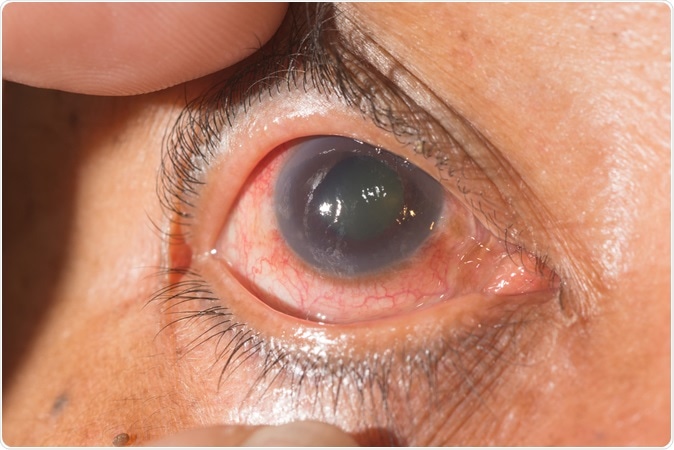According to a new study from the University of Washington School of Medicine there could be an association between Alzheimer’s disease (AD) and three types of degenerative eye diseases.
The study included nearly 3,900 people aged 65 and older who were not diagnosed with Alzheimer’s disease at the start of the study that was part of the “Adult Changes in Thought database”. Over the course of the study 792 of them went on to be diagnosed with the degenerative brain disease.
This project started in 1994 by Kaiser Permanente Washington Health Research Institute researcher Dr. Eric Larson. This team of researchers, from the database noted that patients who were suffering from age-related macular degeneration, glaucoma or diabetic retinopathy had a 40 to 50 percent more chance of developing Alzheimer’s disease compared to those who did not have any of these eye diseases.

Close up of the neo vascular glaucoma during eye examination. Image Credit: ARZTSAMUI / Shutterstock
Study author and UW School of Medicine professor Dr. Paul Crane in a statement said that the results were not so subtle and the connection was clear. The study titled, “Associations between recent and established ophthalmic conditions and risk of Alzheimer's disease,” was published in the latest issue of the journal Alzheimer's & Dementia: The Journal of the Alzheimer's Association.
The study noted that cataracts are not associated with Alzheimer’s disease. They found that there are common shared pathological pathways between ophthalmic diseases and Alzheimer’s disease.
Study lead author Dr. Cecilia Lee, an assistant professor of ophthalmology at the UW School of Medicine explained that not all people with these eye diseases would eventually get Alzheimer’s disease. However this study does provide an important link she said. She said that ophthalmologists should be aware that there is a higher risk of dementia in persons with these eye conditions and patients presenting with them should be routinely checked for dementia, memory or cognitive loss.
The team acknowledges the need for further similar studies before solid conclusions could be drawn. There are 46 million people globally who suffer from Alzheimer’s disease and it is speculated that the numbers might climb to 131.5 million by 2050. Researchers explain that this form of dementia is the most common one and if the right association with eye diseases could be found, it could mean early detection and interventions for those at risk. Authors conclude, “Subsequent studies of ophthalmic diseases in relation to AD and dementia may provide important insights into shared pathological pathways, thus enabling better techniques to prevent and treat.”